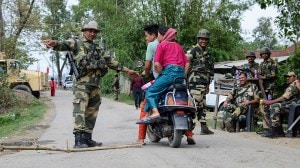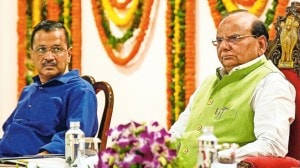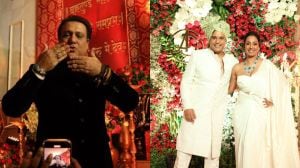- India
- International
New Yet Familiar
The recently-launched channel Zindagi has allowed the Indian audience to reconnect with Pakistani TV content.
 (Clockwise from above) Kaash Main Teri Beti Na Hoti is a social drama about a girl who is sold by her parents for want of money; Aunn Zara will conclude soon and will be replaced by Noor Pur Ki Rani; Zindagi Gulzar Hai is a love story between a rich boy and a middle-class girl.
(Clockwise from above) Kaash Main Teri Beti Na Hoti is a social drama about a girl who is sold by her parents for want of money; Aunn Zara will conclude soon and will be replaced by Noor Pur Ki Rani; Zindagi Gulzar Hai is a love story between a rich boy and a middle-class girl.
An elderly woman lives alone in her bungalow. Her children having left the nest, she has only a mute parrot for company. A number wrongly dialled leads to an unlikely friendship with a young man who mistakes her for a college-going girl. He becomes the cure for her loneliness and she can’t get herself to break away from the bond she has formed with him.
This 40-minute Pakistani short is part of the tele-series, Kitni Girhain Baqi Hain that airs on the recently-launched channel, Zindagi. Focussing on the suppressed needs and desires of women in a patriarchal society, the show breaks the clutter of daily soaps, historical dramas and reality shows on Indian TV.
Although the ratings are yet to be released, critics and a section of the audience have responded positively to the channel, which was launched on June 23 to exclusively air Pakistani content. Shailaja Kejriwal, Chief Creative – Special Projects, Zee Entertainment Enterprises Limited, the network that has launched Zindagi, says the idea was to introduce a fresh flavour to the Indian viewers’ palate.
“Pakistan is close to home. Their stories have a resonance here because there’s a similarity in cultures and lifestyle. At the same time, there is a vast difference in the way these are presented on screen in the two countries. Their language and portrayal of relationships, families is what appeals to us.”
Take for instance the other shows currently airing on the channel, which are contemporary and represent a mix of genres. Zindagi Gulzar Hai follows the story of a fiercely-independent girl of limited means who is being wooed by a rich boy; Aunn Zara is a rom-com between a progressive girl and her male chauvinistic husband; Kaash Mein Teri Beti Na Hoti shows the plight of a girl who is sold by her family in need of money.

While the subjects of these series might have much in common with Indian TV content, the fact that the stories are told sans gimmicks and within a finite number of episodes — 13 to 26 mostly — makes them interesting. “Our shows come closer to reality, and are thus more relatable,” says Pakistani television veteran Sultana Siddiqui, who directed Zindagi Gulzar Hai.
Indian audience’s fondness for Pakistani content isn’t a recent occurrence. An entire generation grew up watching shows from across the border on pirated VHS tapes. Take for instance Dhoop Kinare, penned by Haseena Moin. It’s central character Zoya, a feisty doctor with a bob cut, was lauded for her relationship with a colleague twice her age. The 1987 show was termed “ahead of time”.
However, Indian TV mustered the courage to adapt the show only in 2011 when Sony bought its rights and made it into Kuch Toh Log Kahenge. Moin’s Tanhaiyyan, about two sisters’ battle to reclaim their family home following their parents’ death, inspired filmmaker Imtiaz Ali’s TV series for Star Plus, Imtihaan. There were others such as Ankahi, Angan Tehra and Waris, which found an audience in India.
“The golden era of Pakistani television began with the launch of PTV in 1964 and lasted till the ’80s,” says veteran Pakistani actor Salman Shahid. “It was solid writing and good drama representing stories from across the sections of Pakistani society,” he says, adding that shows from Karachi revolved around illustrious lives from urban centres whereas shows from Lahore brought alive on screen the gullis and mohallas of the city known to be Delhi’s twin across the border.
The launch of Zindagi has once again helped the Indian audience reconnect with Pakistani television content. Two of the series, Aunn Zara and Zindagi Gulzar Hai, are nearly ending. They will be replaced by Noor Pur Ki Rani, based on the English novel Rebecca, and Maat, the story of two strong-willed sisters from a middle-class family, respectively.
“But if Pakistani shows are more realistic, Indian TV series are glamorous. The way India has received our shows on this channel, we have made Indian series a part of our lives,” says Siddiqui, referring to the telecast of Hindi shows that are popular in Pakistan. This exchange, she hopes, is merely the first step in developing a new language of creating new TV content.
“This kind of exchange will help writers, directors and actors from both sides of the border to cross over, bringing with them their styles. What I see emerging is a new form of content that will be a new, hybrid genre unique to the subcontinent,” she says.
amruta.lakhe@expressindia.com
Apr 27: Latest News
- 01
- 02
- 03
- 04
- 05








































